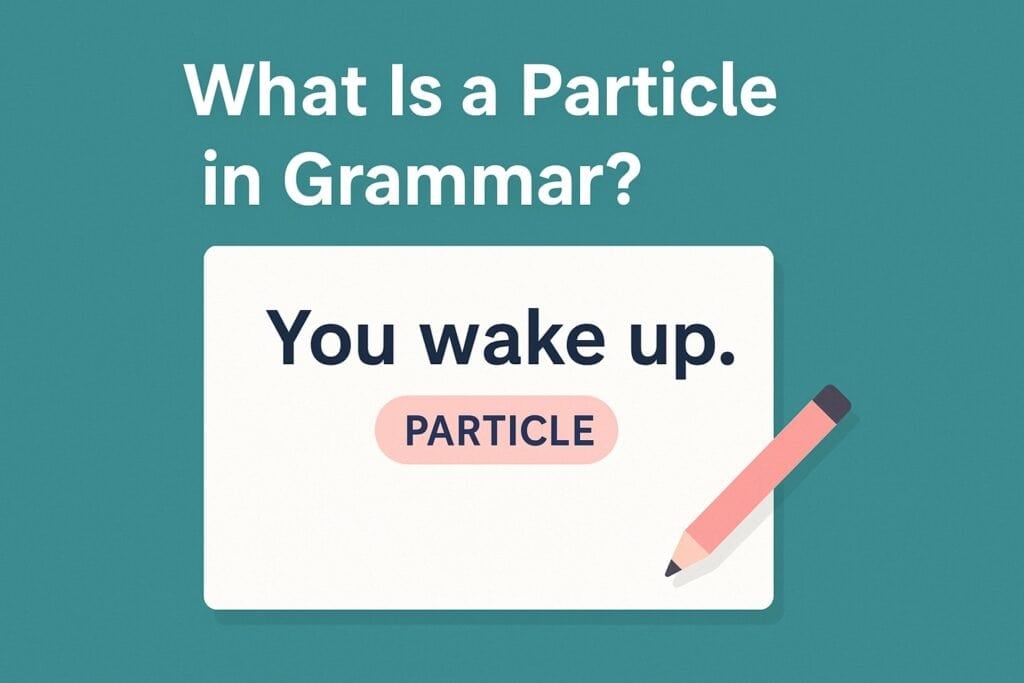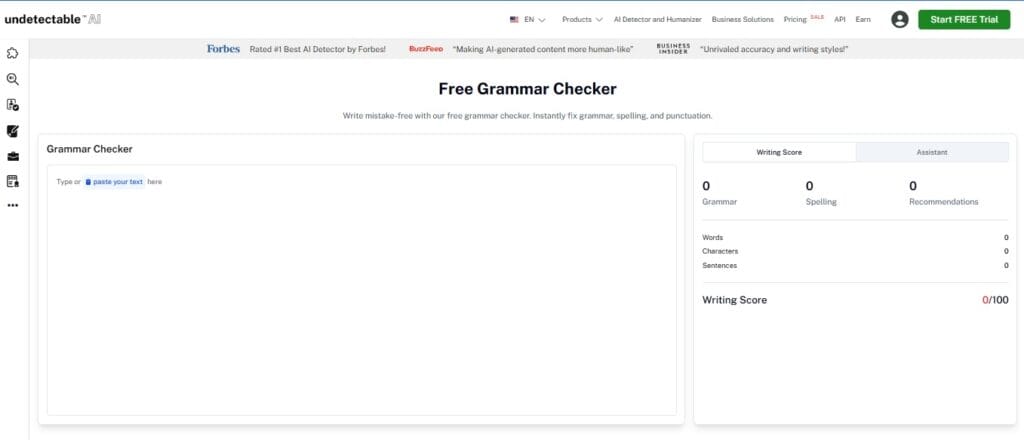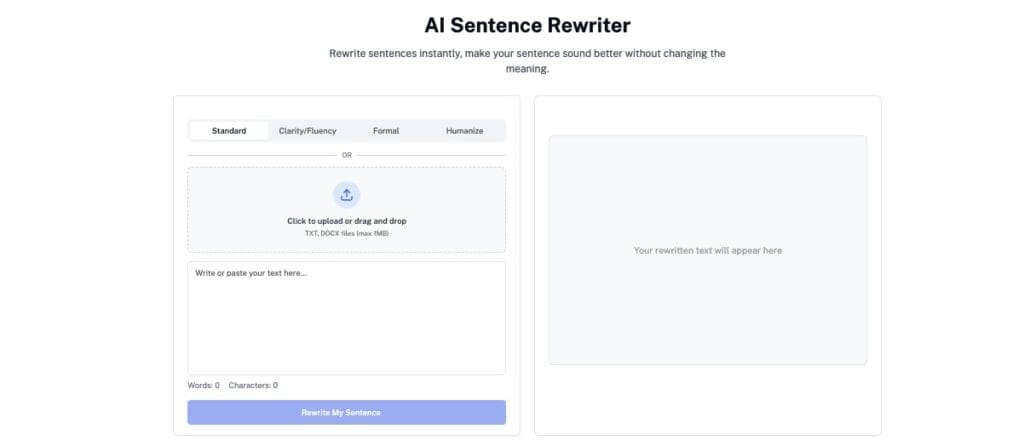Aparentemente, enviar uma mensagem ao seu chefe dizendo que você ‘ficou’ com o cliente quando queria dizer ‘comprometeu-se’, pode fazer com que você queira dar um soco em si mesmo.
Não me faça começar.
Eu achava que o meu inglês era bom. Mas não, sempre há algo que me atrapalha. Naquele dia, aprendi que ‘out’ e ‘up’ podem ter significados muito diferentes dependendo do contexto.
E essas palavras têm até um nome, ou seja, partículas.
Passei um bom tempo a aprender o que é uma partícula na gramática, está na hora de passar esse conhecimento para vocês.
Principais conclusões
- As partículas na gramática inglesa são pequenas palavras que adicionam contexto a uma frase. Elas geralmente são anexadas a um verbo e não têm um significado definitivo por si só.
- Adicionar uma partícula a um verbo pode alterar o significado original desse verbo. Por exemplo, break up significa terminar um relacionamento, enquanto o verbo em si pode significar quebrar ou interromper, dependendo do contexto.
- Você pode adicionar uma partícula diferente ao mesmo verbo e obter palavras com significados diferentes. Get up, get in e get out são exemplos de como as partículas podem formar verbos frasais diferentes.
- As partículas e as preposições podem parecer iguais, mas têm funções diferentes. Uma preposição liga duas palavras numa frase, enquanto uma partícula apenas forma verbos frasais.
- Existem três tipos diferentes de partículas (verbo, negativo e infinitivo). É impossível memorizá-las todas, mas você pode aprendê-las com o tempo, através da exposição e compreensão.

O que é uma partícula na gramática? (Definição simples)
Muito bem, vamos esclarecer isto. O que é uma partícula na gramática inglesa?
As partículas são pequenas palavras que acompanham os verbos e alteram o seu significado. Estou a falar de palavras como para cima, para fora, para fora, para dentro, e longe.
Eles parecem inofensivos se os julgar isoladamente. Adicione-os a um verbo e, de repente, terá uma expressão totalmente nova.


Nunca mais se preocupe com o facto de a IA detetar os seus textos. Undetectable AI Pode ajudar-vos:
- Faça aparecer a sua escrita assistida por IA de tipo humano.
- Bypass todas as principais ferramentas de deteção de IA com apenas um clique.
- Utilização IA com segurança e com confiança na escola e no trabalho.
Você acordar (não apenas acordar).
Você sair (não apenas pendurar).
Você quebrar (não literalmente em pedaços, mas quase isso).
Características das partículas
A definição de partícula diz que é uma palavra que altera verbos para formar verbos frasais, e essas características corroboram essa definição.
- Funcionam em conjunto com os verbos: Uma partícula funciona como parte de uma frase verbal para criar um novo significado. Remova-a e o verbo muitas vezes perde o sentido pretendido.
- Eles não mudam: As partículas nunca assumem finais ou formas. Não se pode fazer para cima, para fora, ou desligado plural ou pretérito. O seu significado depende inteiramente do verbo com que aparecem.
- Eles podem mudar de posição: Em muitos casos, a partícula pode mover-se em torno do objeto. Pode-se dizer que desligar a luz ou desligar a luz, ambas gramaticalmente corretas.
- Elas alteram o significado do verbo.
- Mudar a partícula muda tudo: Decolar significa remover, assumir significa aceitar, e ocupar significa começar algo novo.
Exemplos de partículas em inglês
As partículas escondem-se nas expressões mais comuns e determinam o verdadeiro significado da sua frase.
Deixe-me mostrar alguns exemplos.
1. Combinações de verbos + partículas
Alguns verbos mudam completamente o seu significado dependendo da partícula que os segue. Aqui estão alguns exemplos:
- Apareça – chegar a algum lugar, muitas vezes inesperadamente (Ele chegou atrasado de novo.)
- Ceder – deixar de resistir ou finalmente concordar (Após horas de discussão, ela cedeu.)
- Quebrar – deixar de funcionar ou perder o controlo emocional (O elevador avariou. / Ela começou a chorar.)
2. O mesmo verbo, partículas diferentes
Às vezes, um verbo assume várias partículas, e cada uma delas cria uma nova ideia.
Tomar tomar, por exemplo:
- Decolar – remover algo ou sair rapidamente (Ela tirou o casaco. / O avião descolou ao meio-dia.)
- Enfrentar – aceitar um desafio ou responsabilidade (Ele está a assumir um novo projeto.)
- Assumir – iniciar algo ou começar um hábito (Comecei a pintar.)
O verbo principal permanece o mesmo, mas aquela pequena palavra depois dele muda toda a situação.
3. Partículas e significado no contexto
As partículas são sensíveis ao contexto.
Por exemplo:
- Adiar – pode significar adiar (Eles adiaram a reunião para sexta-feira.), mas também pode significar desencorajar (O cheiro da comida me deixou sem apetite.).
- Treinar – pode significar exercitar-se (Ela faz exercício todas as manhãs.), ou para encontrar uma solução (Eles resolveram o problema juntos.).
O significado depende de como é usado. É por isso que não dá para memorizá-los. Você só vai conseguir aprendê-los no contexto.
4. Partículas vs. Preposições em ação
É fácil confundir partículas com preposições, pois muitas parecem idênticas. A diferença está na sua função.
- Ela procurou o significado da palavra. → Aqui, para cima é um partícula. Completa o significado de olhar.
- Ela olhou para o teto. → Aqui, para cima é um preposição. Mostra a direção e conecta olhou para teto.
Uma boa maneira de diferenciá-los é esta: se remover a palavra altera completamente o significado do verbo, trata-se de uma partícula.
5. Exemplos do dia a dia
Usamos partículas nas nossas conversas diárias com muito mais frequência do que imaginamos.
- Apareça (chegar)
- Aguenta aí (espera)
- Continue (continuação)
É mais fácil entender as partículas quando se analisa o que é uma partícula em exemplos gramaticais.
Partícula vs. Preposição: Qual é a diferença?

Essa foi a parte mais confusa para mim, porque as partículas e as preposições parecem iguais à primeira vista.
Só quando compreender verdadeiramente a definição de partícula é que verá a diferença.
Uma preposição liga palavras e mostra relações. Uma partícula, por outro lado, liga-se a um verbo e altera o seu significado.
Olha para estas duas frases:
- Ela procurou o significado da palavra.
- Ela olhou para o teto.
A mesma palavra, para cima, mas está a fazer duas coisas completamente diferentes. Na primeira frase, para cima é uma partícula porque pertence ao verbo olhar.
Se o remover, o significado muda. “Ela olhou a palavra” não faz sentido. Na segunda frase, para cima é uma preposição porque liga olhou e teto.
Tipos de partículas em inglês
Tal como todos os outros componentes da gramática inglesa, as partículas também têm diferentes tipos.
1. Partículas verbais (verbos frasais)
Uma partícula verbal combina-se com um verbo para criar um novo significado. Na maioria das vezes, esse significado não tem nada a ver com o verbo original.
Por exemplo, aparecer, desmoronar, ceder, etc.
Não é possível compreender estas frases apenas olhando para as palavras individualmente.
2. Partícula negativa
A partícula negativa é provavelmente a mais fácil de identificar, porque é a palavra não. Transforma uma afirmação no seu oposto.
- Eu vou. → Eu não vou.
- Ela gosta de café. → Ela não gosta de café.
3. Partícula infinitiva
A partícula infinitiva é a palavra para que aparece antes da forma básica de um verbo. Aparece em frases como comer, para ir, ou para estudar.
- Quero aprender inglês.
- Ela prometeu ligar.
Como as partículas alteram o significado dos verbos frasais
Estabelecemos que as partículas podem transformar um verbo comum em algo completamente diferente.
Uma pequena palavra e, de repente, a frase passa a dizer algo completamente diferente.
Pode aparecer o volume, recusar uma oferta, desligar as luzes, ou resultar estar certo. Nenhuma dessas frases tem o mesmo significado, mas todas elas compartilham o mesmo verbo de origem.
As partículas não seguem a lógica. Elas seguem o uso. Você as ouve, usa-as e, aos poucos, começa a perceber o que parece certo.
E enquanto espera que esse superpoder chegue até si, tenho algo para o livrar dessa responsabilidade.
Passe o seu texto pelo Undetectable AI Verificador gramatical para que possa capturar partículas erradas e evitar que você cometa um erro como o meu.

A IA indetetável também tem um Perguntar à IA ferramenta para aqueles que aprendem melhor com explicações.
Você pode obter respostas para perguntas como: o que é uma partícula primária na gramática? Isso é uma partícula ou uma preposição?

Também pode utilizar o nosso Verificador de IA para ver como a IA interpreta ou explica conceitos gramaticais complexos, como partículas.
Ajuda-o a avaliar se as explicações ou exemplos que está a ler foram gerados por IA ou escritos por humanos, garantindo que os seus materiais de aprendizagem permaneçam precisos e fiáveis.

Quando a sua prosa começa a parecer um pouco monótona, a nossa IA indetetável Reescrita de frases é uma óptima maneira de explorar alternativas mais enérgicas aos verbos padrão.
Ao experimentar esta ferramenta específica, pode trocar acções de uma só palavra por combinações de frases dinâmicas, garantindo que a sua mensagem chega com mais força e um ritmo muito mais humano.
Erros comuns que os alunos cometem com a partícula
Não é possível dominar as partículas da noite para o dia, mas aprender a evitar alguns erros de principiante é um ótimo ponto de partida.
- Mistura de partículas
Como eu disse acima, as partículas parecem lógicas quando você fala rápido. Eu disse uma vez:, “Vou implicar contigo às 8.” quando eu quis dizer ir buscar-te. A pessoa ficou a olhar para mim como se eu a tivesse ameaçado.
Não use se não tiver 100% certeza do que significa.
- Usando partículas aleatoriamente
Já vi pessoas a inserir partículas aleatoriamente porque os falantes nativos as utilizam com frequência. Mas as partículas não são preenchimentos.
Nove em cada dez vezes, a frase funciona melhor sem isso.
- Encomenda errada
Às vezes, a partícula se move, às vezes não, e às vezes depende do que vem a seguir.
Desligue a luz e Desligue a luz ambos funcionam. Desligue, isso não. Outras línguas não fazem esse tipo de mudança, mas bem... o inglês faz.
Como identificar uma partícula numa frase
As partículas confundem-nos porque parecem preposições ou advérbios, mas a gramática das partículas comporta-se de forma diferente.
Uma maneira simples de identificar um é verificar se ele alterou o significado do verbo. Por exemplo, olhar e olhar para cima não significam a mesma coisa.
Você também pode testá-lo movendo-o. Se ainda fizer sentido, você está lidando com uma partícula, não com uma preposição.
As partículas também se associam emocionalmente aos verbos. Cada uma delas conta uma história ligeiramente diferente. Aprenda a perceber melhor essa mudança emocional e começará a identificá-la em todos os lugares.
Teste a sua escrita através do nosso Detector de IA e Humanizador no widget abaixo!
Conclusão
Ainda tenho pesadelos sobre quando costumava inserir partículas aleatoriamente nas minhas frases sem saber o seu significado. Eram erros inocentes, sim, mas eram mortificantes.
Levei algum tempo para aprender as regras da gramática inglesa e, às vezes, ainda cometo alguns erros aqui e ali.
Aprender o que é uma partícula na gramática também pode levar algum tempo.
Como presente de despedida, aqui vai a minha última dica.
Utilização IA's indetectáveis ferramentas para ajudá-lo nessa jornada. Isso evitará que cometa muitos erros!
